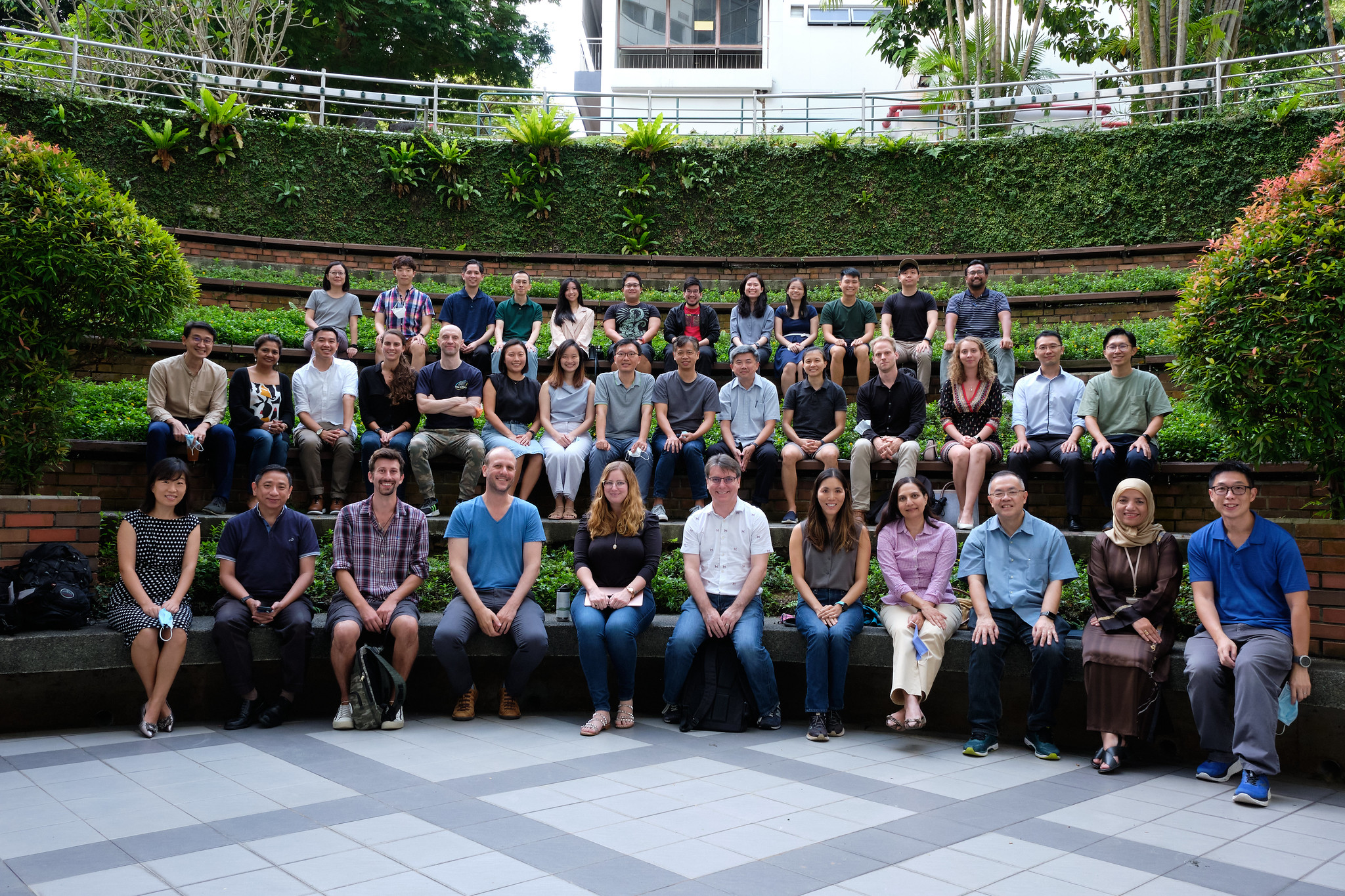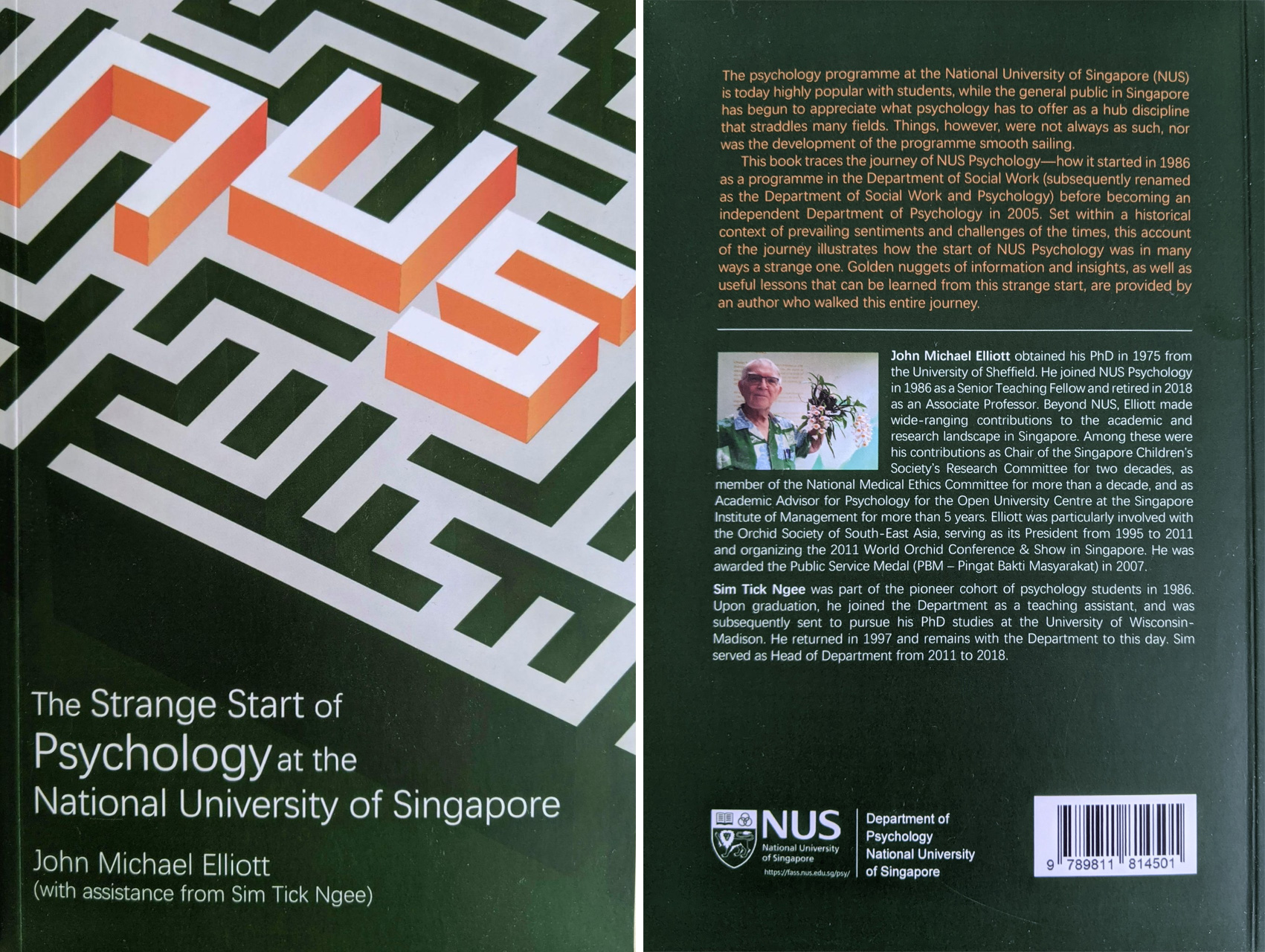Overview & History
The NUS psychology programme was first introduced during the 1986-87 academic year and is the oldest psychology programme in Singapore.

NUS offers a full undergraduate programme, including an honours course, as well as Masters and Ph.D. programmes. Since its inception, the psychology programme has attracted a strong response from students in the Faculty of Arts and Social Sciences. Psychology contributes to society by providing behavioural scientists who are equipped with the skills to use empirical research methods to seek an account of human behaviour and experience. It has been only a little over a hundred years that psychology has been a discipline in its own right.
In addition to being a scientific discipline, psychology has a professional and vocational role. For instance, psychologists are involved in the assessment of mental disability and mental illness, and subsequently contribute to treatment, rehabilitation and training of individuals with these conditions. Psychologists are also involved in such diverse areas as counselling, occupational guidance, and the development of health education and other public campaigns. As such, the Department of Psychology has established and maintains links with the Singapore Psychological Society and various institutions that provide psychological services, such as the Ministries of Defence; Culture, Community and Youth; Social and Family Development; Education; and Health, and government hospitals.
A Very Brief History of Psychology in NUS
The Department of Psychology in NUS started life in 1986 as a degree programme in the Department of Social Work. This was the first degree programme in psychology to be offered by any institution in Singapore, and had an initial intake of 70 students taught by at first one and then two staff members. In 1988, the Department became a Department of Social Work and Psychology, and continued to host the separate degree programmes, each with their own student intake, while dedicated staff numbers had risen to six. In 1989, 52 general degree holders with psychology major graduated, and in 1990, a first batch of 12 psychology honours graduates followed.
In 2005, a fully distinct and autonomous Department of Psychology was formed. Today, nearly 1,000 students take an introductory psychology course every year, and many of them go on to declare a psychology major. In a department with a complement of 44 full-time and 11 adjunct staff, all major areas of psychology are taught and researched. From the inception of the programme, it was intended that the programme should be academically eclectic and produce graduates who are academically the equal in coverage and standards of any from overseas institutions.
As the programme developed, postgraduate research students joined the department, the first Masters student being enrolled in 1990 and the first Ph.D. in 1993. Between 2002 and 2007, an applied (non-clinical) psychology Masters degree was offered, but in 2008 this was discontinued after graduating 26 students, and the department launched a postgraduate Masters programme in Clinical Psychology (M.Clin.Psy). To date, 55 clinically qualified graduates have emerged.


The Strange Start of Psychology at the National University of Singapore
The journey of NUS Psychology—how it started in 1986 as a programme in the Department of Social Work before becoming an independent Department of Psychology in 2005—is traced in the book, The Strange Start of Psychology at the National University of Singapore (NUS Department of Psychology, 2021). The e-book version is freely available for download here. A limited number of print copies in paperback are also available for purchase here.
Set within a historical context of prevailing sentiments and challenges of the times, this account of the journey illustrates how the start of NUS Psychology was in many ways a strange one. Golden nuggets of information and insights, as well as useful lessons that can be learnt from this strange start, are provided by author John Elliott, who taught the first cohort of Psychology students at NUS and continued to educate the next generation of psychology academicians and practitioners here before he retired in 2018.
For more information on the history and evolution of the department, please see also the article "Psychology in Singapore" by George Bishop, which appeared in the May 2008 issue of the APS Observer.
A Chronology of Psychology in Singapore
This chronology includes the early development of public service psychology in Singapore.
1823
Sir Stamford Raffles lays a foundation stone for an institution to provide education and instruction and also undertake research. His intention was to include natural philosophy in the syllabus. However, his institution did not materialise until 1905 when a medical college was founded. Had it succeeded earlier, psychology might have emerged earlier in Singapore in consequence of the proposed element of philosophy.
1905
Foundation of the Straits Settlements & Federated Malay States Government Medical School.
1928
A new mental hospital is established in Yio Chu Kang.
1930
Singapore Psychological Association (SPA) is founded, with Mr Stuart as President & Dr Frankel as Vice-President.
1949
The University of Malaya is established with Rt Hon Malcolm MacDonald as Chancellor and Dr G.V. Allen as Vice-Chancellor. The King Edward VII College of Medicine becomes the Faculty of Medicine and Raffles College becomes the Faculties of Arts and Science.
1952
Psychology is taught as part of the curriculum for Social Work, which offers a new two-year Social Studies Diploma.
1954
The University of Malaya founds the Department of Philosophy. Philosophy staff later include Frank Cioffi, a critic of Freudian psychoanalysis, and C.C. Leong, pioneer in the establishment of psychology in the armed forces.
1955
Nanyang University is founded as the first Chinese language university in Singapore.
1956
VW Wilson is appointed to build a Psychological service. Wong Man Kee serves as pupil psychologist at WBH.
1959
Singapore gains full internal self-government. M.K. Wong gains his Dip.Clin.Psych. and succeeds Wilson at WBH.
1962
University of Singapore is formed from University of Malaya.
1965
Singapore becomes a fully independent republic. The University of Singapore establishes a Department of Sociology, but decides not to establish a Psychology department or degree studies.
1966
Educational Psychologist Yip Wing Kee heads the Singapore Armed Forces Education Department after developing a Ministry of Education Guidance unit.
1967
The inception of National Service in Singapore. The Public Service Commission sets policy to expand the numbers of psychologists. Mr F.Y. Long, clinical psychologist, is appointed to assist M.K. Wong at WBH.
1968
CC Leong heads MINDEF Personnel Research & Education Department.
1973
Ministry of Home Affairs appoints Loh Y.P. as psychologist in Prisons, RTC and DRC, and appoints an Australian psychologist to the Ministry of Social Affairs.
1976
Nanyang University proposes Psychology and Sociology programmes.
1978
CC Leong publishes Youth in the Army, with a favourable foreword by then Minister of Defence Dr Goh Keng Swee.
1979
Singapore Psychological Society founded, with F.Y. Long as first President.
1980
National University of Singapore (NUS) is formed by a merger of Nanyang University and the University of Singapore. The Nanyang psychology programme is abandoned, and its books transferred to the NUS library. Singapore Psychiatric Association founded, Dr Chee Kuan Tzee as first President.
1982
MOE sets up an Educational Psychology Unit.
1986
First Psychology degree course starts in the NUS Social Work Department with G Harrison (72 students). Head of Department is Mrs Ann Wee.
1987
The Department of Social Work is renamed Social Work & Psychology. Dr S Vasoo, MP, becomes Head. Prof H.J. Eysenck visits Singapore, meets then PM Lee Kuan Yew and discusses psychology manpower needs for Singapore.
1989
First cohort of 52 BA psychology majors graduate in NUS.
1990
First Psychology Honours graduates (n = 11). Full-time graduate staff comprise Vera Bernard-Opitz, Anthony Chang, Chang Weining Chu, Chua Fook Kee, John Elliott, Loke Wing Hong, Susan J Rickard-Liow, Elizabeth Marx and Ramadhar Singh. First Masters candidate by research registered.
1997
Singapore Institute of Management (SIM) hosts the UK Open University psychology honours degree, with J. Elliott as initial academic adviser. SIM set up this and other degree programmes to facilitate education for adults in the working population. The degrees were later awarded locally by SIM, after 2012 by SIM University, and after 2016 by the Singapore University of Social Sciences (SUSS).
1998
Ngiam Tee Liang becomes Head of Social Work and Psychology.
2001
The Singapore Management University (SMU) moves to a new downtown campus, having been formed at the Cluny Road campus of the Former University of Singapore in 2000.
2003
Chua Fook Kee becomes Head of Social Work and Psychology at NUS.
2004
Visiting Psychology Committee hears representations from staff, and suggests separation of Psychology from Social Work. NTU founds its School of Humanities and Social Sciences, which includes psychology.
2005
Social Work and Psychology become separate departments. The nine full-time staff of the new Department of Psychology comprise George Bishop (Head), Chua Fook Kee, Winston Goh, Steve Graham, Nicholas Hon, Susan Rickard-Liow, Sim Tick Ngee, Ramadhar Singh and Vicky Tan.
2006
The Institute of Mental Health (IMH) replaces WBH at nearby Buangkok Green.
2007
Psychology major offered at SMU.
2008
First enrollments in Master’s degree programmes in Clinical Psychology, one a joint degree with the University of Melbourne, the other a single degree from NUS.
2009
James Cook University (JCU) Singapore launches Master of Psychology (MPsy) and Doctor of Psychology (DPsy) in Clinical Psychology.
2011
Sim Tick Ngee becomes Head of Department at NUS.
2015
NUS Concurrent Masters degree in psychology initiated, comprising a B.Soc.Sci. and M.Soc.Sci. over a five-year programme of study.
2016
Full-time psychology staff now number 45 at the start of the year, with recruitment in progress.
2019
Winston Goh becomes Head of Department at NUS. The Social Service SkillsFuture Tripartite Taskforce (STT) Psychology sub-team was formed by the Ministry of Social and Family Development (MSF). The STT brought together academics, policymakers and respected practitioners from various professions in the sector, to build on the SkillsFuture Skills Framework for Social Service to ensure that training programmes and curricula relating to the practice and training of psychologists in Singapore are relevant and up-to-date. STT completed its work in 2025.
2022
Arising from STT discussions, Professional Certificates designed to advance the expertise of both practicing and academic psychologists were launched by NUS Psychology under its Continuing Education and Training (CET) Programme. 3 Professional Certificates were introduced in the inaugural run.
2025
Mike Cheung becomes Head of Department at NUS.

